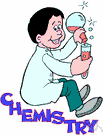chemical science
Also found in: Thesaurus, Wikipedia.
Related to chemical science: JACS
ThesaurusAntonymsRelated WordsSynonymsLegend:
Switch to new thesaurus
| Noun | 1. |  chemical science - the science of matter; the branch of the natural sciences dealing with the composition of substances and their properties and reactions chemical science - the science of matter; the branch of the natural sciences dealing with the composition of substances and their properties and reactionselectronegativity, negativity - (chemistry) the tendency of an atom or radical to attract electrons in the formation of an ionic bond atomic mass, atomic weight, relative atomic mass - (chemistry) the mass of an atom of a chemical element expressed in atomic mass units molecular weight, relative molecular mass - (chemistry) the sum of the relative atomic masses of the constituent atoms of a molecule valence, valency - (chemistry) a property of atoms or radicals; their combining power given in terms of the number of hydrogen atoms (or the equivalent) pH, pH scale - (from potential of Hydrogen) the logarithm of the reciprocal of hydrogen-ion concentration in gram atoms per liter; provides a measure on a scale from 0 to 14 of the acidity or alkalinity of a solution (where 7 is neutral and greater than 7 is more basic and less than 7 is more acidic); Dalton's law of partial pressures, law of partial pressures, Dalton's law - (chemistry and physics) law stating that the pressure exerted by a mixture of gases equals the sum of the partial pressures of the gases in the mixture; the pressure of a gas in a mixture equals the pressure it would exert if it occupied the same volume alone at the same temperature distribution law - (chemistry) the total energy in an assembly of molecules is not distributed equally but is distributed around an average value according to a statistical distribution equilibrium law, law of chemical equilibrium - (chemistry) the principle that (at chemical equilibrium) in a reversible reaction the ratio of the rate of the forward reaction to the rate of the reverse reaction is a constant for that reaction Henry's law - (chemistry) law formulated by the English chemist William Henry; the amount of a gas that will be absorbed by water increases as the gas pressure increases law of constant proportion, law of definite proportions - (chemistry) law stating that every pure substance always contains the same elements combined in the same proportions by weight law of equivalent proportions, law of reciprocal proportions - (chemistry) law stating that the proportions in which two elements separately combine with a third element are also the proportions in which they combine together Dalton's law, law of multiple proportions - (chemistry) law stating that when two elements can combine to form more than one compound the amounts of one of them that combines with a fixed amount of the other will exhibit a simple multiple relation law of mass action - (chemistry) the law that states the following principle: the rate of a chemical reaction is directly proportional to the molecular concentrations of the reacting substances Mendeleev's law, periodic law - (chemistry) the principle that chemical properties of the elements are periodic functions of their atomic numbers natural science - the sciences involved in the study of the physical world and its phenomena chemoimmunology, immunochemistry - the field of chemistry concerned with chemical processes in immunology (such as chemical studies of antigens and antibodies) organic chemistry - the chemistry of compounds containing carbon (originally defined as the chemistry of substances produced by living organisms but now extended to substances synthesized artificially) inorganic chemistry - the chemistry of compounds that do not contain hydrocarbon radicals physical chemistry - the branch of chemistry dealing with the physical properties of chemical substances electrochemistry - branch of chemistry that deals with the chemical action of electricity and the production of electricity by chemical reactions femtochemistry - the branch of chemistry that studies elementary (often very fast) chemical reactions as they occur; the experimental methods are often based on the use of femtosecond laser pulses geochemistry - the chemistry of the earth's crust photochemistry - branch of chemistry that deals with the chemical action of light nuclear chemistry, radiochemistry - the chemistry of radioactive substances surface chemistry - the branch of chemistry that studies processes occurring at interfaces between phases (especially those between liquid and gas) atomist theory, atomistic theory, atomic theory, atomism - (chemistry) any theory in which all matter is composed of tiny discrete finite indivisible indestructible particles; "the ancient Greek philosophers Democritus and Epicurus held atomic theories of the universe" Arrhenius theory of dissociation, theory of dissociation, theory of electrolytic dissociation - (chemistry) theory that describes aqueous solutions in terms of acids (which dissociate to give hydrogen ions) and bases (which dissociate to give hydroxyl ions); the product of an acid and a base is a salt and water Ostwald's theory of indicators, theory of indicators - (chemistry) the theory that all indicators are either weak acids or weak bases in which the color of the ionized form is different from the color before dissociation |
Based on WordNet 3.0, Farlex clipart collection. © 2003-2012 Princeton University, Farlex Inc.